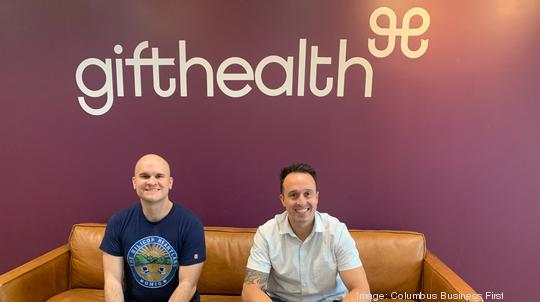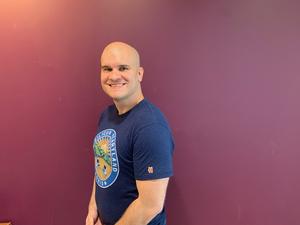
Tech-enabled pharmacy GiftHealth Inc. sold a majority stake for $40 million in a tough funding market for startups, and plans rapid hiring ahead of multimillion-dollar contracts set to start this summer.
Eir Partners, a Miami private equity firm focused entirely on healthcare technology, takes a 51% stake valuing the just over two-year-old startup at about $79 million, GiftHealth co-founder and CEO Nick Potts told Columbus Inno.
Fifteen minutes into their first video call in December, Eir founder Brett Carlson offered workable strategies for growing the business, Potts said.
"That hadn't happened with any investor," he said. "I was completely blown away. They are complete healthcare nerds like I am. ... Genuinely, we can learn things from them."
"It's amazing for us to find a partner willing to join us for the ride," GifthHealth co-founder John Romano said. "We're probably more motivated than we ever were."
Founded in 2015, Eir has participated in transactions worth more than $5 billion to date, according to its website. Its typical initial investment is $15 million to $75 milion. Two portfolio companies were acquired for $1 billion and $3 billion in 2019, according to media reports.
"We are very excited about backing the (GiftHealth) team and disrupting the pharmacy experience for U.S. consumers," Carlson said via email.
By year's end GiftHealth will hunt for a new Central Ohio space to unite its headquarters, now just north of downtown on 4th Street, with its Bethel Road dispensing pharmacy and drug wholesaling operation it acquired last year in Michigan. It has about 65 employees; six regional sales directors, from Florida to California, start next week.
The company is soon to add its first CFO, whose last company grew to $800 million in revenue. (The hire has not yet been announced.)
GiftHealth had nearly $29 million in revenue last year and aims to more than double to $75 million this year, Potts said. Before now it had raised a cumulative $6.5 million in venture capital.
Although it's a general pharmacy, GiftHealth specializes in essential procedure-specific drugs that retail pharmacies don't like to stock. Some 15% of U.S. gastroenterologists use GiftHealth for mail delivery of prescription colonoscopy prep kits. The kits often are out of stock at stores because they take up shelf space and don't build customer loyalty for a procedure done every 10 years.
This year GiftHealth will add a cardiology network for drugs needed before a heart attack patient can be discharged from a hospital, and roll out kits including eye drops and patches for ophthalmology procedures.
Being part of the process to detect cancer and recover from a heart attack "makes the work really meaningful," Potts said.
The startup also has beat other vendors for a deal to help an unnamed manufacturer launch a new drug.
Its software integrates with electronic health records, and doctors customize the platform to send out their specific instructions to patients and automate text reminders for starting the medication. Meanwhile its analytics draw on some 100 million past claims to inform its model for finding the best price, apply manufacturer vouchers, and seek available inventory.
The company hired a data scientist a year ago to find sticking points in the process. For example, the software gathers health record data to auto-fill applications for vouchers; the patient needs only verify and approve.
As the software improves, Romano said, incoming customer service phone calls are decreasing despite growing prescription volume.
Revenue comes from software subscriptions by pharmacies, manufacturers and telehealth companies. Patients pay only the cost of the drug to the dispensing pharmacy, whether GiftHealth or a partner.
Nine in 10 prescriptions are filled by a network of some 4,000 partner pharmacies across the country. GiftHealth's wholesaler obtains drugs from manufacturers and supplies them to pharmacies at lower prices than major distributors, Romano said, which helps the stores make a profit on drugs with low insurance reimbursement.
PE said yes after VC said no
Nationally over the past year, startups are having trouble raising capital and many have seen valuations decrease. VC firms are poised for the fifth consecutive quarter of declining investments, Bay Area Inno reported.
Before finding Eir, Potts had unsuccessfully pitched to nearly 50 VC firms. All said no – they wanted software only, not a company that handles a physical product. Early GiftHealth investors recommended shifting focus to healthcare specialists.
"I should have identified that earlier myself," Potts said.
Potts and Romano said they were comfortable signing over majority ownership to Eir because they are aligned on their healthcare mission and a goal to seek acquisition or IPO within four years.
The deal brings additional payments if the startup hits milestones such as achieving profitability next year.
"It's better for the future of the company," Potts said. "They have helped build massive healthcare companies."
Eliminating barriers for patients to obtain needed medications will drive GiftHealth's growth despite an uncertain economy, Potts said.
"The problem is so massive," he said. "(The investors) want us to help as many patients as possible. The financials will follow."







